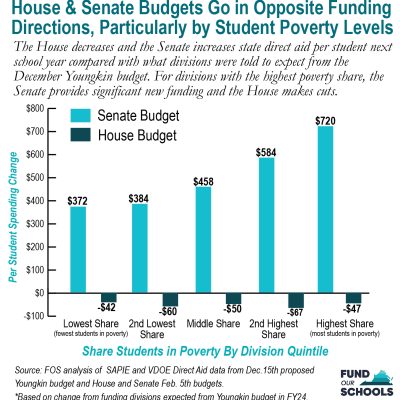House Budget Proposals Prioritize Corporations over Virginia Children; Senate Proposals Respond to Student Needs
Virginia lawmakers have a remarkable opportunity this year to significantly improve educational opportunities for our children, who are facing considerable barriers right now.
The Senate of Virginia took major steps toward that goal in their proposed budget, including fully lifting the cap put in place during the Great Recession that limited state funding for support staff, increasing state supported school staff pay by an additional 2% along with accompanying bonus equal to $1,000 for each of these positions, increasing funding for high poverty schools, adding more instructors for English Learners, funding additional mental and physical health staff, a significant increase in state funding for reading specialists and instructional aides, and much more. Every student in Virginia will benefit, and students who need the most help – those attending the highest-poverty schools – will see the largest boosts in the Senate proposal (see figure).

Unfortunately, the House budget mostly maintains the same upside-down priorities as Governor Youngkin’s budget proposal, putting tax cuts for profitable corporations before funding for Virginia’s students and providing $140 million less to school divisions in Direct Aid than the schools were told by the Department of Education in December they would receive. While the House budget’s inclusion of a 2% pay increase in lieu of the proposed bonuses and additional funding for reading specialists are small steps in the right direction, overall, the House budget falls well short of what is included in the Senate budget for Virginia students.
Virginia recently received an “F” for school funding effort in the annual Making the Grade report by the Education Law Center. That should be unacceptable to all Virginia lawmakers. The Senate budget provides a sound and research-based path forward, and we hope to see a compromise budget that puts students first.
Fund Our Schools will be holding a press conference in the House Briefing Room on Tuesday, February 7th at 8:30am with an official response from many of the coalition’s organizations to the budgets and recommendations for a pathway forward.
Ashley C. Kenneth, President & CEO of The Commonwealth Institute for Fiscal Analysis, stated: “Virginia has $4.5 billion in available resources this year. The Senate has seized this opportunity to invest in creating great schools in every neighborhood and making sure students who face the highest barriers get the resources they need. Unfortunately, the House of Delegates follows the governor’s lead in using almost none of those resources for Virginia’s school children. For a fraction of the money the governor and majority of the House of Delegates wants to spend on corporate tax cuts, the Senate funds the state share of about 1,200 nurses and other licensed mental and behavioral health providers in our schools and about 6,500 additional support staff by fully lifting the arbitrary support cap, provides extra resources for students attending high-poverty schools, and holds school divisions harmless for the state Department of Education’s school funding calculation error.”
Jenna Alexander, President Elect of the Virginia PTA, stated: “Children in Virginia should have the supports they need in school so they can focus on learning. Until we truly address the mental health crisis in our schools, students will continue facing barriers to fully participating in school and getting on track academically. The Senate budget makes meaningful progress by investing around $57 million in specialized support staff to address behavioral health needs, including social workers and school psychologists. The Senate budget also provides nearly $310 million to fully lift the Support Cap and add instructional aides to high-need schools. Adding thousands of critical support positions to schools will provide students additional time and attention from caring adults and allow employees like counselors to be able to focus more on their job supporting students, rather than filling in the gaps in staffing shortages. The Senate also provides $27.5 million to schools for reading specialists for middle school students, many of whom continue to struggle with reading. On the other side, the House budget doesn’t make any significant new investments to address our student mental health crisis and only provides for about half as many reading specialists for middle school students.”
Jorge Figueredo, Executive Director of Edu-Futuro, stated: “For years, Virginia lawmakers have failed to adequately invest in supports for our English Learner students, and our state SOL tests reflect that. These students have fallen the furthest behind over the past three years. The Senate budget recognizes this fact and provides state funding for additional instructors for English Learner students as the state’s Board of Education prescribes in their Standards of Quality. Sadly, the House budget completely ignores these students’ need for support.”
Fallon Speaker, Legal Director of the Youth Justice program of Legal Aid Justice Center, stated: “The Virginia government has a constitutional duty to fully fund our public schools, and has been failing in that responsibility. In order to fulfill that responsibility, the revised Standards of Quality from the Virginia Board of Education must be fully funded. The budget proposal from the Senate continues to make progress on funding the SOQs with the addition of investments in specialized support positions to address student mental health and additional instructors for English learners. The House budget on the other hand, fails to make any progress this year on funding the SOQs.”
Dr. James Fedderman, President of the Virginia Education Association, responded to the budget release: “The House and Senate budgets took first steps in addressing our worsening staffing crisis in schools. Both budgets increased the state portion of pay for state-supported school positions by an additional 2%. The Senate also provided funding for each state supported school employee to receive a $1,000 bonus in December 2023. Increasing the competitiveness of educators’ compensation is an important step, but meaningfully addressing our staffing shortages will take more. By fully lifting the support cap and providing additional funding for specialized support positions, the Senate budget goes much further than the House to provide adequate staffing so that teachers will not need to wear so many hats at once – acting as the nurse, librarian, counselor, etc. – and can focus on their expertise: teaching.”
Virginia Senate budget invests far more per student than House budget
In almost every school division, but particularly in rural and high-poverty school divisions, the Virginia Senate invests significantly more than the House in their budget. In Danville, the Senate invests a whopping $1,733 more than the House does per student. In Petersburg, it’s $1,283 more. The Senate budget provides 82 more new staff positions in Danville and 54 in Petersburg over the House.
